湖北省黄冈市2013届高三3月质量检测【英语试题】 Word版含答案
- 格式:doc
- 大小:475.00 KB
- 文档页数:18
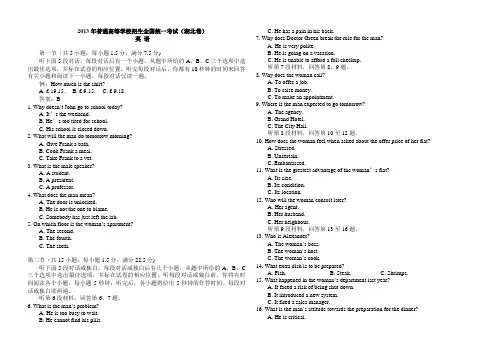
2013年普通高等学校招生全国统一考试(湖北卷)英语第一节(共5小题;每小题1.5分,满分7.5分)听下面5段对话。
每段对话后有一个小题,从题中所给的A、B、C三个选项中选出最佳选项,并标在试卷的相应位置。
听完每段对话后,你都有10秒钟的时间来回答有关小题和阅读下一小题。
每段对话仅读一遍。
例:How much is the shirt?A. £ 19.15.B. £ 9.15.C. £ 9.18.答案:B1. Why doesn’t John go to school today?A. It’s the weekend.B. He’s too tired for school.C. His school is closed down.2. What will the man do tomorrow morning?A. Give Frank a bath.B. Cook Frank a meal.C. Take Frank to a vet.3. What is the male speaker?A. A student.B. A president.C. A professor.4. What does the man mean?A. The door is unlocked.B. He is not the one to blame.C. Somebody has just left the lab.5. On which floor is the woman’s apartment?A. The second.B. The fourth.C. The sixth.第二节(共15小题;每小题1.5分,满分22.5分)听下面5段对话或独白。
每段对话或独白后有几个小题,从题中所给的A、B、C 三个选项中选出最佳选项,并标在试卷的相应位置。
听每段对话或独白前,你将有时间阅读各个小题,每小题5秒钟;听完后,各小题将给出5秒钟的作答时间。
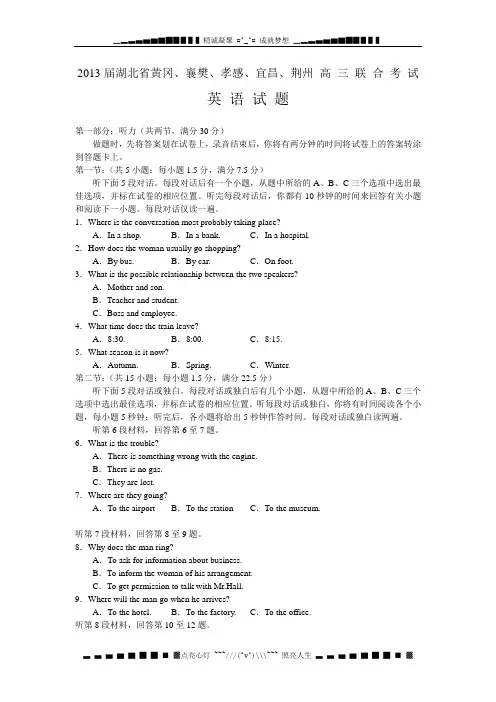
2013届湖北省黄冈、襄樊、孝感、宜昌、荆州高三联合考试英语试题第一部分:听力(共两节,满分30分)做题时,先将答案划在试卷上,录音结束后,你将有两分钟的时间将试卷上的答案转涂到答题卡上。
第一节:(共5小题:每小题1.5分,满分7.5分)听下面5段对话。
每段对话后有一个小题,从题中所给的A、B、C三个选项中选出最佳选项,并标在试卷的相应位置。
听完每段对话后,你都有10秒钟的时间来回答有关小题和阅读下一小题。
每段对话仅读一遍。
1.Where is the conversation most probably taking place?A.In a shop. B.In a bank. C.In a hospital.2.How does the woman usually go shopping?A.By bus. B.By car. C.On foot.3.What is the possible relationship between the two speakers?A.Mother and son.B.Teacher and student.C.Boss and employee.4.What time does the train leave?A.8:30. B.8:00. C.8:15.5.What season is it now?A.Autumn. B.Spring. C.Winter.第二节:(共15小题;每小题1.5分,满分22.5分)听下面5段对话或独白。
每段对话或独白后有几个小题,从题中所给的A、B、C三个选项中选出最佳选项,并标在试卷的相应位置。
听每段对话或独白,你将有时间阅读各个小题,每小题5秒钟;听完后,各小题将给出5秒钟作答时间。
每段对话或独白读两遍。
听第6段材料,回答第6至7题。
6.What is the trouble?A.There is something wrong with the engine.B.There is no gas.C.They are lost.7.Where are they going?A.To the airport B.To the station C.To the museum.听第7段材料,回答第8至9题。

湖北省八市2013年高三年级三月调考英语参考答案和听力材料湖北省八市2013年高三三月调考英语试题参考答案第一部分听力(共两节,满分30分)1----5 BBACB 6--10 CABAB 11--15 ABBBA 16--20 ACAAC第二部分:词汇知识运用(共两节,满分30分)第一节:多项选择(共10小题;每小题1分,满分10分)21---25 CCBAB 26--30 BCCDA第二节:完型填空31--35 CBDCA 36—40 DBACC 41—45 DAACB 46—50 ABDBC第三部分阅读理解(共20小题,每小题2分,满分40分)51--54 CDCD 55--58 BBBA 59--62 ABDA 63--66 BCCB 67--70 ADBC第四部分:书面表达(共两节,满分50分)第一节:完成句子(共10小题,每小题2分,满答案第1页(共9页)分20分)71. before they got together72. the more confident you will be/feel73.when the Chinese (people) were engaged74. he (should) be appointed75.has it been made clear76. has paid off77.many students to attend78. what they thought was/a way that they thought was79. that are to blame80. needn’t have dressed up/needn’t have been dressed第二节:书面表达(满分30分)I still remember the day when I was left alone at home .I carelessly broke the vase, which was much treasured by my father. When he came back,I was so fearful that I didn't tell the truth. The cat was my excuse. My father答案第2页(共9页)said nothing, but I could read his distrust .The next morning, after a restless night, I admitted to my father that it was my fault. I saw relief in his eyes. He smiled to me. From then on, I never told lies. My honesty won me great trust from others, which benefited my growth a lot. The accident, or exactly the “crack” forced me to mind my behavior.I t is the" crack "that is reminding me all the time that I have a long way to go. With the light through the crack I can see the road ahead clearly.答案第3页(共9页)评分标准:第一节:完成句子以0;0.5;1;1.5;2分计分:以下题为例:Little ____________ what she looks like; all she cares about is her job performance. (care)她不在乎外表,她在乎的是自己的工作表现。
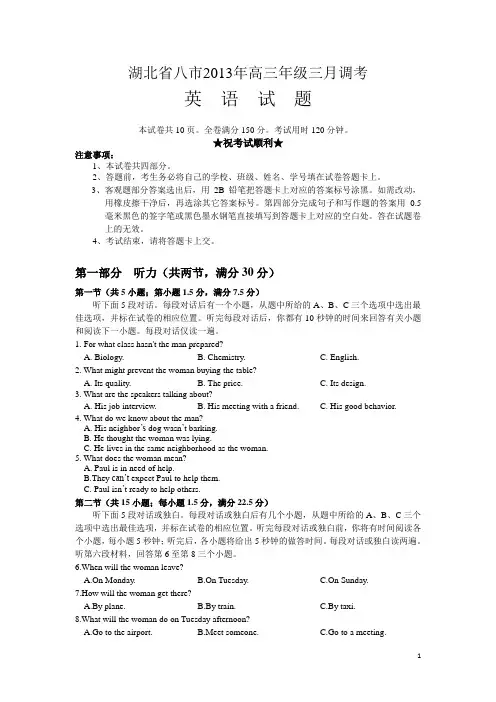
湖北省八市2013年高三年级三月调考英语试题本试卷共10页。
全卷满分150分。
考试用时120分钟。
★祝考试顺利★注意事项:1、本试卷共四部分。
2、答题前,考生务必将自己的学校、班级、姓名、学号填在试卷答题卡上。
3、客观题部分答案选出后,用2B铅笔把答题卡上对应的答案标号涂黑。
如需改动,用橡皮擦干净后,再选涂其它答案标号。
第四部分完成句子和写作题的答案用0.5毫米黑色的签字笔或黑色墨水钢笔直接填写到答题卡上对应的空白处。
答在试题卷上的无效。
4、考试结束,请将答题卡上交。
第一部分听力(共两节,满分30分)第一节(共5小题;第小题1.5分,满分7.5分)听下面5段对话。
每段对话后有一个小题,从题中所给的A、B、C三个选项中选出最佳选项,并标在试卷的相应位置。
听完每段对话后,你都有10秒钟的时间来回答有关小题和阅读下一小题。
每段对话仅读一遍。
1. For what class hasn't the man prepared?A. Biology.B. Chemistry.C. English.2. What might prevent the woman buying the table?A. Its quality.B. The price.C. Its design.3. What are the speakers talking about?A. His job interview.B. His meeting with a friend.C. His good behavior.4. What do we know about the man?A. His neighbor’s dog wasn’t barking.B. He thought the woman was lying.C. He lives in the same neighborhood as the woman.5. What does the woman mean?A. Paul is in need of help.B.They can’t expect Paul to help them.C. Paul isn’t ready to help others.第二节(共15小题;每小题1.5分,满分22.5分)听下面5段对话或独白。
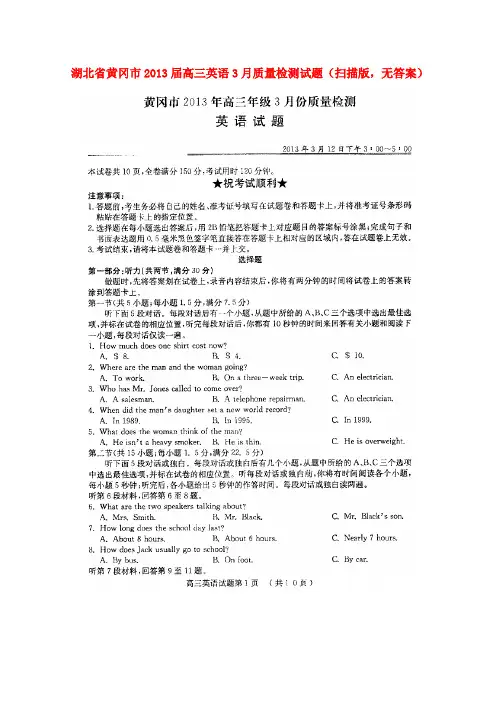
湖北省黄冈市2013届高三英语3月质量检测试题(扫描版,无答案)听力录音材料Text 1W: Price are really going up. I had to pay four dollars for a shirt yesterday, and I used to pay only three.M: I know what you mean. My sweaters cost me twice as much as your new shirts now. Text 2W: Did you turn off the lights and check the clocks on all the doors and windows? M: Yes, and I told the neighbors we’d be gone for three weeks. They will keep an eye on the house for us. And the Smiths said they would go to China next year, too. Text 3M: This is Mr. Johns. My heater is not working and the temperature is going to get down below freeing. Could you come over and fix it、W: This is our busiest time of the year but I’ll speak to one of our men about getting over there sometime today.T ext 7M: Hello. Can I speak to Susan, please?W: Speaking. Is that you, Tom?M: Yes, it is. I am going to New Zealand in two weeks’ time, and my wife is going with me.W: Oh, how lucky you are! How long will you be away?M: For a couple of months, maybe half a year. My boss wants me to set up a branch company there. Well, Susan, you have been to New Zealand several times. Can you give us some suggestions, or just tell us about that country?W: I’d love to. We can have a talk sometime.M: Why not come over to dinner at my house this weekend? My wife wants to meet you as well.W: All right, what about Saturday?M: OK. See you at 6:00 p.m. this coming Saturday. Goodbye!Text 8M: Where can I stay in this town?W: There are lots of hotels, but they tend to be fairly expensive. And then there are bed and breakfast places, which are much cheaper. You can find out about them by looking in the paper, or else just walking around the streets. They have signs in the windows saying “Bed and Breakfast”. Then there are youth hostels.M: What are the youth hotels like?W: Oh, they are good. All you get is a bed, but they tend to be very cheap.M: Do I have to become a member?W: Yes, you have to, in fact. But it’s very easy to join, and there’s an office along the road, where you can go and sign up.。
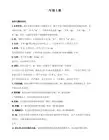
黄冈市2013年高三年级3月份质量检测英语试题2013 年3 月12 日下午3 : 00〜5 : 00本试卷共10页,全卷满分分,考试用时120分钟。
★祝考试顺利★注意事项:1. 答题前,考生务必将自己的姓名、准考证号填写在试题卷和答题卡上,并将准考证号条形码粘贴在答题卡上的指定位置2. 选择题在每小题选出答案后,用2B铅笔把答题卡上对应题卡的答案标号涂黑;完成句子和书面表达题用0.5毫米黑色签字笔直接答在答题卡上相对应的区域内,答在试题卷上无效。
3. 考试结束,请将本试题卷和答题卡一并上交。
选择题第一部分:听力(共两节,满分30分)做题时,先将答案划在试卷上,录音内容结束后,你将有两分钟的时间将试卷上的答案转涂到答题卡上。
第一节(共5小题;每小题I. Δ分,满分7.5分)听下面5段对话,每段对话后有一个小题,从题中所给的A、B、C三个选项中选出最佳选项,并标在试卷的相应位置,听完每段对话后,你都有10秒钟的时间来冋答有关小题和阅读下一小题,每段对话仅读一遍。
1. How much does one shirt cost now?A. $ 8. B, $ 4. C. $ 10.2. Where are the man and the woman going?A. To work.B. On a three—week trip.C. An electrician.3. Who has Mr. Jones called to come over?A. A salesman.B. A telephone repairman.C. An electrician.4. When did the man 7S daughter set a new world record?A. In 1989.B. In 1995.C. In 1999.5. What does the woman think of the man?A. He isn’t a heavy smoker.B. He is thin.C. He is overweight.第二节(共15小题;每小题1. 5分,满分22. 5分)听下面5段对话或独白。
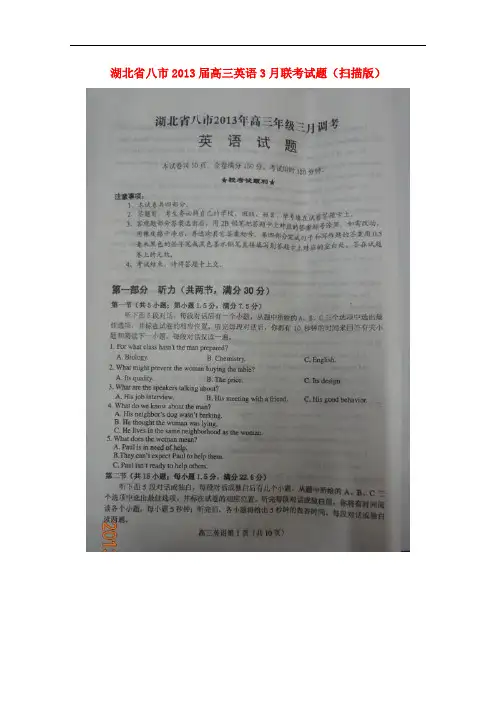
湖北省八市2013届高三英语3月联考试题(扫描版)湖北省八市2013年高三三月调考英语试题参考答案第一部分听力(共两节,满分30分)1----5 BBACB 6--10 CABAB 11--15 ABBBA 16--20 ACAAC第二部分:词汇知识运用(共两节,满分30分)第一节:多项选择(共10小题;每小题1分,满分10分)21---25 CCBAB 26--30 BCCDA第二节:完型填空31--35 CBDCA 36—40 DBACC 41—45 DAACB 46—50 ABDBC第三部分阅读理解(共20小题,每小题2分,满分40分)51--54 CDCD 55--58 BBBA 59--62 ABDA 63--66 BCCB 67--70 ADBC第四部分:书面表达(共两节,满分50分)第一节:完成句子(共10小题,每小题2分,满分20分)71. before they got together72. the more confident you will be/feel73.when the Chinese (people) were engaged74. he (should) be appointed75.has it been made clear76. has paid off77.many students to attend78. what they thought was/a way that they thought was79. that are to blame80. needn’t have dressed up/needn’t have been d ressed第二节:书面表达(满分30分)I still remember the day when I was left alone at home .I carelessly broke the vase, which was much treasured by my father. When he came back ,I was so fearful that I didn't tell the truth. The cat was my excuse. My father said nothing, but I could read his distrust .The next morning, after a restless night, I admitted to my father that it was my fault. I saw relief in his eyes. He smiled to me. From then on, I never told lies. My honesty won me great trust from others, which benefited my growth a lot. The accident, or exactly the “crack” forced me to mind my behavior.It is the" crack "that is reminding me all the time that I have a long way to go. With the light through the crack I can see the road ahead clearly.评分标准:第一节:完成句子以0;0.5;1;1.5;2分计分:以下题为例:Little ____________ what she looks like; all she cares about is her job performance. (care)她不在乎外表,她在乎的是自己的工作表现。
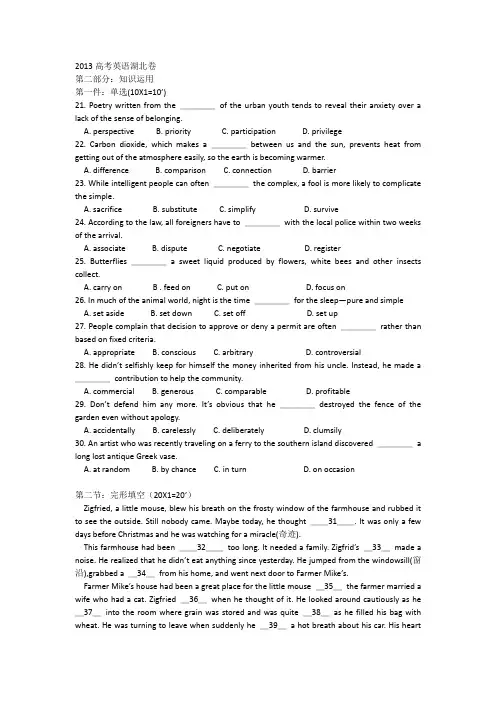
2013高考英语湖北卷第二部分:知识运用第一件:单选(10X1=10’)21. Poetry written from the ____of the urban youth tends to reveal their anxiety over a lack of the sense of belonging.A. perspectiveB. priorityC. participationD. privilege22. Carbon dioxide, which makes a ____between us and the sun, prevents heat from getting out of the atmosphere easily, so the earth is becoming warmer.A. differenceB. comparisonC. connectionD. barrier23. While intelligent people can often ____the complex, a fool is more likely to complicate the simple.A. sacrificeB. substituteC. simplifyD. survive24. According to the law, all foreigners have to ____with the local police within two weeks of the arrival.A. associateB. disputeC. negotiateD. register25. Butterflies ____a sweet liquid produced by flowers, white bees and other insects collect.A. carry on B . feed on C. put on D. focus on26. In much of the animal world, night is the time ____for the sleep—pure and simpleA. set asideB. set downC. set offD. set up27. People complain that decision to approve or deny a permit are often ____rather than based on fixed criteria.A. appropriateB. consciousC. arbitraryD. controversial28. He didn’t selfishly keep for himself the money inherited from his uncle. Instead, he made a ____contribution to help the community.A. commercialB. generousC. comparableD. profitable29. Don’t defend him any more. It’s obvious that he ____destroyed the fence of the garden even without apology.A. accidentallyB. carelesslyC. deliberatelyD. clumsily30. An artist who was recently traveling on a ferry to the southern island discovered ____a long lost antique Greek vase.A. at randomB. by chanceC. in turnD. on occasion第二节:完形填空(20X1=20’)Zigfried, a little mouse, blew his breath on the frosty window of the farmhouse and rubbed it to see the outside. Still nobody came. Maybe today, he thought __31__. It was only a few days before Christmas and he was watching for a miracle(奇迹).This farmhouse had been __32__too long. It needed a family. Zigfrid’s _33_made a noise. He realized that he didn’t eat anything since yesterday. He jumped from the windowsill(窗沿),grabbed a _34_from his home, and went next door to Farmer Mike’s.Farmer Mike’s house had been a great place for the little mouse _35_the farmer married a wife who had a cat. Zigfried _36_when he thought of it. He looked around cautiously as he _37_into the room where grain was stored and was quite _38_as he filled his bag with wheat. He was turning to leave when suddenly he _39_a hot breath about his car. His heartbeat _40_, and without thinking he started to run and luckily _41_the cat’s paws(爪子). The next afternoon Zigfried heard some good news: a _42_family would be moving into the farmhouse soon. Zigfrieds granny would arrive on Christmas Eve to _43_with HIM. He hoped that the family would come before his granny came. Before long, a car came _44_the road leading to the house, with butter sandwiches, cheese and chocolate.Zigfried’s Christmas miracle did arrive!The house came _45_the next few days. Zigfried _46_every single hour of them. _47_, the day before Christmas when he was drinking hot chocolate with a _48_smile at the door of his home, he heard the _49_of the children of the family about what they might get for the Christmas. What? A cat? The _50_froze on his face; his mouth fell wide open. After a long white, he at last found his voice:”Hey! Whose Christmas miracle is this?”31. A. carefully B. excitedly C. hopefully D. proudly32. A. shabby B. noisy C. messy D. empty33. A. mouth B. nose C. stomach D. throat34. A. bag B. stick C. bowl D. coat35. A. although B. until C. whereas D. unless36. A. leapt B. sniffed C. trembled D. withdrew37. A. broke B. marched C. paced D. stole38. A. curious B. nervous C. pitiful D. sensible39. A. took B. released C. felt D. drew40. A. strongly B. irregularly C. slowly D. wildly41. A. escaped B. seized C. rubbed D. scratched42. A. close B. happy C. new D. young43. A. celebrate B. communicate C. compete D. compromise44. A. across B. from C. off D. up45. A. alive B. loose C. open D. still46. A. counted B. enjoyed C. missed D, wasted47. A. However B. Instead C. Moreover D. Therefore48. A. bitter B. forced C. polite D. satisfied49. A. instruction B. discussion C. comment D. debate50. A. blood B. smile C. tear D. sweat第三部分:阅读理解(20X2=40’)ASome years ago, writing in my diary used to be a usual activity. I would return from school and spend the expected half hour recording the day’s events, feelings and impressions in my little blue diary. I did not really need to express my emotions by way of words, but I gained a certain satisfaction from seeing my experiences forever recorded on paper. After all, isn’t accumulating memories a way of preserving the past?When I was thirteen years old, I went on a long journey on foot in a great valley, well-equipped with pen, a diary and a camera. During the trip, I was busy recording every incident, name and places I came across. I felt proud to be spending my time productively, dutifully preserving for future generations a detailed description of my travels. In my last night there, I wandered out ofmy tent, diary in hand. The sky was clear and lit by the glare of the moon, and the walls of the of the valley looked threatening behind their screen of shadows. I automatically took my pen…At this point, I understood that nothing I wrote could ever match or replace the few seconds I allowed myself to experience the dramatic beauty of the valley. All I remembered of the previous few days were the dull characterization I had set down in my diary.Now, I only write in my diary when I need to write down a special thought or felling. I still love to record ides and quotations that strike me in books, or observations that are particularly meaningful. I take pictures, but not very often—only of objects I fined really beautiful. I’m no longer blindly satisfied with having something to remember when I grow old. I realize that life will simply pass me by if I stay behind the camera, busy preserving the present so as to live it in the future.I don’t want to wake up one day and have nothing but a pile of pictures and notes. Maybe I won’t have as many exact representations of people and places; maybe I’ll forget certain facts, but at least the experiences will always remain inside me. I don’t live to make memories-- just live, and the memories from themselves.51. Before the age of thirteen, the author regarded keeping a diary as a way of ____.A. observing her school routineB. expressing her satisfactionC. impressing her classmatesD. preserving her history52. What caused a change in the author’s understanding of keeping a diary?A. A dull night on the journeyB. The beauty of the great valleyC. A striking quotation from a bookD. Her concerns for future generations53. What does the author put in her diary now?A. Notes and beautiful picturesB. Special thoughts and feelingsC. Detailed accounts of daily activitiesD. Descriptions of unforgettable events.54. The author comes to realize that to live a meaningful life is____.A. to experience itB. to live the present in the futureC. to make a memoriesD. to give accurate representations of itBMothers and daughters go through so much—yet when was the last time a mother and daughter sat down to write a book together about it all? Peri Klass ad her mother Sheila Solomon Klass, both gifted professional writers, prove to be ideal co=writer as they examine their decades of motherhood, daughterhood, and the wonderful ways their lives have overlapped(重叠).Perri notes with amazement how closely her own life has mirrored her mother’s: both have full-time careers; both have published books, articles, and stories; each has three children; they both love to read. They also love to travel—in fact, they often take trips together. But in truth, the harder they look at their lives, the more they acknowledge their big differences in circumstance and basic nature.A child of the Depression(大萧条),Sheila was raised in Brooklyn by parents who considered education a luxury for girls. Starting with her college education, she has fought for everything she’s ever accomplished. Perri, on the other hand, grew up privileged in the New Jersey suburbs of the 1960s and 1970s. For Sheila, wasting time or money is a crime, and luxury is unthinkable while Perri enjoys the occasional small luxury, but has not been successful at trying to persuade her mother into enjoying even the tiniest thing she likes.Each writing in her own unmistakable voice, Perri and Sheila take turns exploring the joys and pains, the love and bitterness, the minor troubles and lasting respect that have always boned them together. Sheila describes the adventure of giving birth to Perri in a tiny town in Trinidad where her husband was doing research fieldwork. Perri admits that she can’t sort out all the mess in the households, even though she knows it drives her mother crazy. Together they compare thoughts on bringing up children and working, admit long-hidden sorrows, and enjoy precious memories.Looking deep into the lives they have lived separately and together, Perri and Sheila tell their mother-daughter story with honesty, humor, enthusiasm, and admiration for each other. A written account in two voices, Every Mother is a Daughter is a duet(二重奏) that produces a deep, strong sound with the experiences that all mothers and daughters will recognize.55. Why does Peri think that her own life had mirrored her mother?A. They both have gone through difficult times.B. They have strong emotional ties with each other.C. They have the same joys and pains, and love and bitterness.D. They both have experiences as daughter, mother and writer.56. The word ”luxury” is Paragraph 3 means ____.A. something rare but not pleasantB. something that cannot be imaginedC. something expensive but not necessaryD. something that can only be enjoyed by boys57. What is Paragraph 4 mainly about?A. The content of the bookB. The purpose of the bookC. The influence of the bookD. The writing style of the book58. How are women’s lives explored in this book?A. In a musical formB. Through field researchC. With unique writing skillsD. From different point of viewCWe’ve reached a strange—some would say unusual—point. While fighting world hunger continues to be the matter of vital importance according to recent report from the World Health Organization (WHO), more people now die from being overweight, r say, from being extremely fat, than from being underweight. It’s the good life that’s more likely to kill us these days. Worse, nearly 18 million children under the age of five around the world are estimated to be overweight. What’s going on?We really don’t have many excused for our weight problems. The dangers of the problem have been drilled into us by public-health campaign since 2001 and the message in getting through—up to a point.In the 1970s, Finland, for example, had the highest rate of heart disease in the world and being overweight was its main cause. Not any more. A public-health campaign has greatly reduced the number of heart disease deaths by 80 percent over the past three decades.Maybe that explains why the percentage of the people in Finland taking diet pills doubled between 2001 and 2005, and doctors even offer surgery of removing fat inside and change the shape of the body. That has become sort of fashion. No wonder it ranks as the world’s most body-conscious country.We know that what we should be doing to lose weight—but actually doing it is another matter. By far the most popular excuse is not taking enough exercise. More than half of us admit we lackwillpower.Others blame good food. They say: it’s just too inviting and it makes them overeat. Still others lay the blame on the Americans, complaining that pounds have piled on thanks to eating too much American-style fast food.Some also blame their parents—their genes. But fortunately, the parents are wronged because they’re normal in shape, or rather slim.It’s similar story around the world, although people are relatively unlikely to, have tried to lose weight. Parents are eager to see their kids shape up. Do as I say—not as I do.59. What is the strange point mentioned in the first sentence?A. The good life is a greater risk than the bad lifeB. Starvation is taking more people’s lives in the worldC. WHO report shows people’s unawareness of food safetyD. Overweight issue remains unresolved despite WHO’s efforts.60. Why does the author think that people have no excuse for being overweight?A. A lot of effective diet pills are available.B. Body image has nothing to do with good foodC. They have been made fully aware of its dangers.D. There are too many overweight people in the world.61. The example of Finland is used to illustrate ____.A. the cause of heart diseaseB. the fashion of body shapingC. the effectiveness of a campaignD. the history of a body-conscious country62. Which would be the best title for the passage?A. Actions or Excuse?B. Overweight or Underweight?C. WHO in a DilemmaD. No Longer Dying of HungerDThe technology is great Without it we wouldn’t have been able to put a man on the moon, explore the ocean’s depth or eat microwave sausages. Computers have revolutionized out lives and they have the power to educate and pass on knowledge. But sometimes this power can create more problems than it solves.Every doctor had had to try their best to calm down patients who’ve come into their surgery waving an Internet print-out, convinced that they have some rare incurable disease, say, throat cancer. The truth is usually far more ordinary, though: they don’t have throat cancer, and it’s just that their throats are swollen. Being a graduate of the Internet ‘school’ of medicine does not guarantee accurate self-health-check.One day Mrs. Almond came to my hospital after feeling faint at work. White I took her blood sample and tried to find out what was wrong, she said calmly,” I know what’s wrong; I’ve got throat cancer. I know there’s nothing you doctors can do about it and I’ve just got to wait until the day comes.”As a matter of routine I ordered a chest X-ray. I looked at it and the blood results an hour later. Something wasn’t right. “Did your local doctor do an X-ray?” I asked. “Oh, I haven’t been to the doctor for years,” she replied,” I read about it on a website and the symptom fitted, so I knew that’s what I had.”However, some of her symptoms, like the serve cough and weight loss, didn’t fit with it—but she’d just ignored this.I looked at the X-ray again, and more tests confirmed it wasn’t the cancer but tuberculosis(肺结核)—something that most certainly did need treating, and could be deadly. She was lucky we caught it when we did.Mrs. Almond went pale when I explained she would have to be on treatment for the next six months to ensure that she was fully recovered. It was certainly a lesson for her. “I’m so embarrassed.” Shaking her head, as I explained that all the people she had come into close contact with would have to be found out and tested. She listed up to about 20, and then I wentto my office to type up my notes. Unexpectedly, the computer was not working, so I had wait until someone from the IT department came to fix it. Typical. Maybe I should have a microwave sausage while I waited?63. Mrs. Almond talked about her illness calmly because____.A. she thought she knew it well.B. she had purchased medicine online.C. she graduated from a medical schoolD. she had been treated by local doctors.64. It was lucky for Mrs. Almond ____.A. to have contacted many friendsB. to have recovered in a short timeC. to have her assumption confirmedD. to have her disease identified in time65. Mrs. Almond said “I’m so embarrassed” (Para.7) because ____.A. she had distrusted her close friendsB. she had caused unnecessary troubleC. she had to refuse the doctor’s adviceD. she had to tell the truth to the doctor66. By mentioning the breakdown of the computer, the author probably wants to prove .A. it’s a must to take a break at workB. it’s vital to believe in IT professionalsC. It’s unwise to simply rely on technologyD. it’s a danger to work long hours on computers.EA German study suggests that people who were too optimistic about their future actually faced greater risk of disability or death within 10 years than those pessimists who expected their future to be wrong.The paper, published this March in Psychology and Aging, examined health and welfare surveys from roughly 40,000 Germans between age 18 and 96. The surveys were conducted every year from 1993-2003.Survey respondents(受访者) were asked to estimate their present and future life satisfaction on a scale of 0 to 10 among other questions.The researchers found that young adults(age 18-39) routinely overestimated their future life satisfaction, while middle-aged (40-64) more accurately predicted how they would feel in the future. Adults of 65 and older, however, were far more likely to underestimate their future life satisfaction. Not only did they feel more satisfied than they bought they would, the older pessimists seemed to suffer a lower ratio(比率) of disability and death for the study period.“ We observed that being too optimistic in predicting a better future than actually observed was associated with a greater risk of disability and a greater of death within the following decade.”wrote Frieder R. Lang, a professor at the University of Erlangen-Nuremberg.Lang and his colleagues believed that people who were pessimistic about their future may be more careful about their actions than people who expected a rosy future.“Seeing a dark future may encourage positive evaluations of the actual self and may contribute to taking improved precautions(预防措施),” the author wrote.Surprisingly, compared with those in poor health or who had low incomes, respondents who enjoyed good health or income were associated with expecting a greater decline. Also, the researchers said that the higher income was related to a greater risk of disability.The author of the study noted that there were limitations to their conclusions. Illness, medical treatment and personal loss could also have driven health outcomes.However, the researchers said a pattern was clear. “We found that from early to late adulthood, individuals adapt their expectation of future life satisfaction from optimistic, to accurate, to pessimistic,” the authors concluded.67. According to the study, who made the most accurate prediction of their future life satisfaction?A. Optimistic adultB. Middle-aged adultsC. Adults in poor healthD. Adults of lower income68. Pessimism may be positive in some way because it causes people ____.A. to fully enjoy their present lifeB. to estimate their contribution accuratelyC. to take measures against potential risksD. to value health more highly than wealth69. How do people of higher income see their future?A. They will earn less moneyB. They will become pessimisticC. They will suffer mental illnessD. They will have less time to enjoy life70. What is the clear conclusion of the study?A. Pessimism guarantees’ chances of survivalB. Good financial condition leads to good healthC. Medical treatment determines health outcomesD. Expectations of future life satisfaction decline with age第四部分:书面表达(共两节,满分50分)第一节:完成句子(10X2=20’)71. Knowing ____reduces the risks of failure and it works like an insurance policy for your own ability. (do)知道你正在干什么,能降低失败的风险,这就像给自己的能力买保险一样。
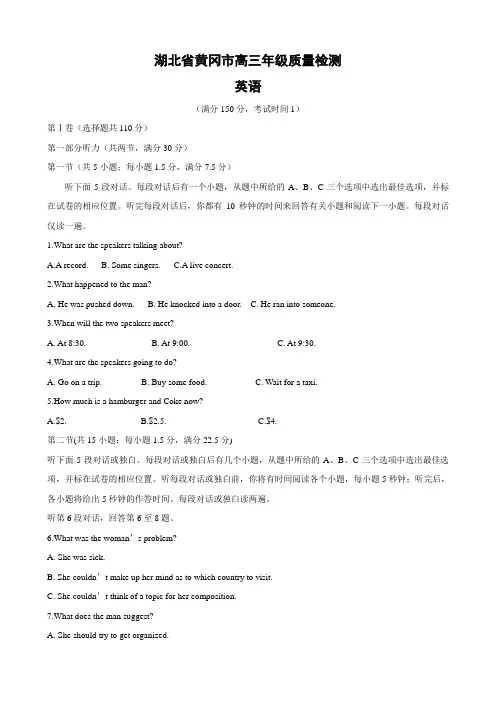
湖北省黄冈市高三年级质量检测英语(满分150分,考试时间1)第Ⅰ卷(选择题共110分)第一部分听力(共两节,满分30分)第一节(共5小题;每小题1.5分,满分7.5分)听下面5段对话。
每段对话后有一个小题,从题中所给的A、B、C三个选项中选出最佳选项,并标在试卷的相应位置。
听完每段对话后,你都有10秒钟的时间来回答有关小题和阅读下一小题。
每段对话仅读一遍。
1.What are the speakers talking about?A.A record.B. Some singers.C.A live concert.2.What happened to the man?A. He was pushed down.B. He knocked into a door.C. He ran into someone.3.When will the two speakers meet?A. At 8:30.B. At 9:00.C. At 9:30.4.What are the speakers going to do?A. Go on a trip.B. Buy some food.C. Wait for a taxi.5.How much is a hamburger and Coke now?A.$2.B.$2.5.C.$4.第二节(共15小题;每小题1.5分,满分22.5分)听下面5段对话或独白。
每段对话或独白后有几个小题,从题中所给的A、B、C三个选项中选出最佳选项,并标在试卷的相应位置。
听每段对话或独白前,你将有时间阅读各个小题,每小题5秒钟;听完后,各小题将给出5秒钟的作答时间。
每段对话或独白读两遍。
听第6段对话,回答第6至8题。
6.What was the woman’s problem?A. She was sick.B. She couldn’t make up her mind as to which country to visit.C. She couldn’t think of a topic for her composition.7.What does the man suggest?A. She should try to get organized.B. She should ride a camel.C. She should write about her trip.8.Why does the man have to leave?A. He has to pack his bags for his trip.B. He has to write his own composition.C. He is not feeling well.听第7段材料,回答第9至11题。
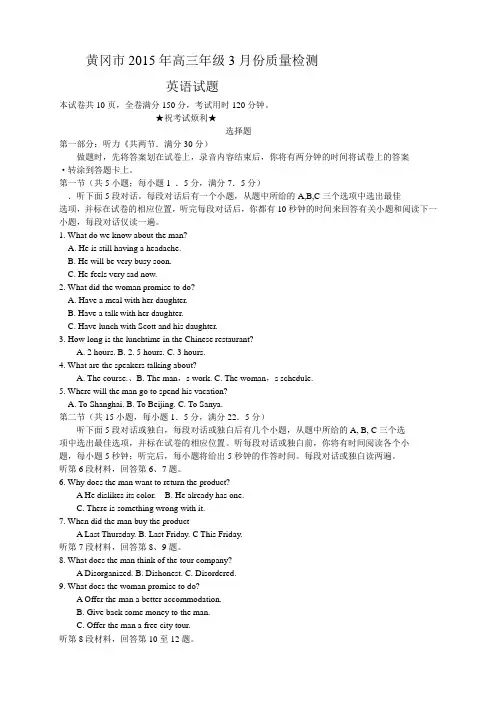
黄冈市2015年高三年级3月份质量检测英语试题本试卷共10页,全卷满分150分,考试用时120分钟。
★祝考试烦利★选择题第一部分:听力《共两节.满分30分)做题时,先将答案划在试卷上,录音内容结束后,你将有两分钟的时间将试卷上的答案·转涂到答题卡上。
第一节(共5小题;每小题1 .5分,满分7.5分).听下面5段对话。
每段对话后有一个小题,从题中所给的A,B,C三个选项中选出最佳选项,并标在试卷的相应位置,听完每段对话后,你都有10秒钟的时间来回答有关小题和阅读下一小题,每段对话仅读一遍。
1. What do we know about the man?A. He is still having a headache.B. He will be very busy soon.C. He feels very sad now.2. What did the woman promise to do?A. Have a meal with her daughter.B. Have a talk with her daughter.C. Have lunch with Scott and his daughter.3. How long is the lunchtime in the Chinese restaurant?A. 2 hours.B. 2. 5 hours.C. 3 hours.4. What are the speakers talking about?A. The course.、B. The man,s work.C. The woman,s schedule.5. Where will the man go to spend his vacation?A. To Shanghai.B. To Beijing.C. To Sanya.第二节(共15小题,每小题1.5分,满分22.5分)听下面5段对话或独白,每段对话或独白后有几个小题,从题中所给的A, B, C三个选项中选出最佳选项,并标在试卷的相应位置。
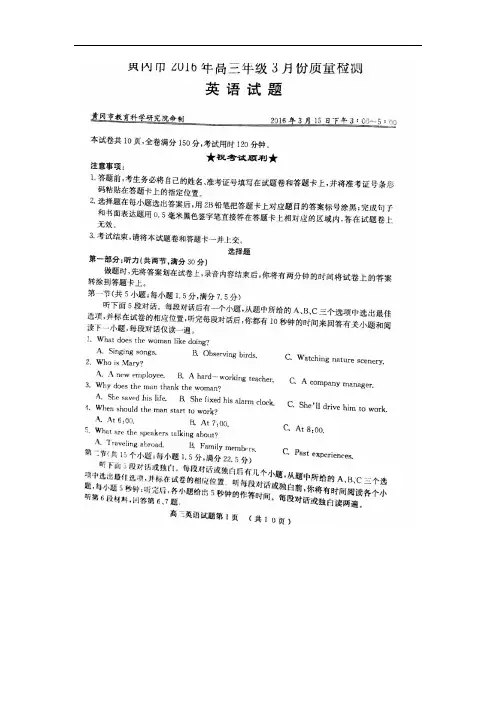
黄冈市2016届高三3月调考英语参考答案1—20 BBCCA CABCA ABCBA ABBCC21—40 BDA CBAC BBCA ADAA BFGDE41—60 BDABC ADDDC CBADB ACDCC61. natural 62. eating 63. is 64. our 65. the 66. possibly 67. for 68.teeth69. when/while/if 70. to try短文改错I was walking to school this morning when I caught a sight of an old womanwith awalking stick lain on the ground. I ran over quick to help her up and asked her whatwas wronglying quicklywith her. She told me she slips and fell due to heart trouble.slippedI was worrying and decided to take her to a hospital. And then I went to a department storeworriednear the hospitals and contacted her family. Soon her son and daughter came∧the hospital. Hehospital to Theythanked and praised me for my kindness by writing me a thank-you letter. AlthoughI was later forlateschool today, I felt very proud of that I had done.what书面表达Dear Sir/Madam,I have read your advertisement in the newspaper. You mentioned in it that your instructors are fully qualified and you ensure that learners will be able to swimwell after one week’s training.I can swim a little but I’m not very confident in the water. So I’m interestedin taking part in the training course. Fortunately, the summer holiday is aroundthe corner. I’m writing to inquire when and where the course will be given, andhow long the training course will last each day.I also want to know how much you will charge me for that.Besides, would you be so kind as to tell me whether there is anything special that should be prepared or does your company provide everything necessary?I am looking forward to hearing from you soon.Yours sincerely,Li Hua答案解析阅读理解A篇:本文通过四组数字回看我国的独生子女政策。
高三英语参考答案A卷第一部分:听力1-5 CABCA 6-10 ABCAC 11-15 CACBB 16-20 BCAAB第二部分:词汇知识运用第一节:多项选择21-25 BCDAA 26-30 DCCCB第二节:完形填空31-35 BCDAC 36-40 CDACB 41-45 ADACA 46-50 BDBDA第三部分:阅读理解A篇:CDBA B篇:CCBA C篇:DDAB D篇:DBDCE篇:DCAA第四部分:书面表达第一节:完成句子71. had better not be/get angry 72. where I was brought up73. seeing the ground covered with/by 74. would have been injured75. whatever happens 76. where it was that77.should we study hard 78. make the public aware of79. whether he will attend 80. to be thought of as第二节:短文写作Possible version:Go to university near or far?Different classmates have different opinions about going to a university outside or inside their city. Some think they would like to study at a university far away from their homes so that they can lead a different life on their own. Besides, there are more chances for them to make new friends, more fun and challenges for them to experience in the university. Above all, they can gain more working experience for their future jobs.But others think they should choose a university in their local city, for they and their parents can take good care of each other, and they don’t have to spend much money on transportation because of short distance. What’s more, they can take great advantage of home living conditions for their studies.B卷就是在A卷的基础上,B变A,C变B,D变C,A变D。
黄冈市2013年高三年级3月份质量检测英语试题2013 年3 月12 日下午3 : 00〜5 : 00本试卷共10页,全卷满分分,考试用时120分钟。
★祝考试顺利★注意事项:1. 答题前,考生务必将自己的姓名、准考证号填写在试题卷和答题卡上,并将准考证号条形码粘贴在答题卡上的指定位置2. 选择题在每小题选出答案后,用2B铅笔把答题卡上对应题卡的答案标号涂黑;完成句子和书面表达题用0.5毫米黑色签字笔直接答在答题卡上相对应的区域内,答在试题卷上无效。
3. 考试结束,请将本试题卷和答题卡一并上交。
选择题第一部分:听力(共两节,满分30分)做题时,先将答案划在试卷上,录音内容结束后,你将有两分钟的时间将试卷上的答案转涂到答题卡上。
第一节(共5小题;每小题I. Δ分,满分7.5分)听下面5段对话,每段对话后有一个小题,从题中所给的A、B、C三个选项中选出最佳选项,并标在试卷的相应位置,听完每段对话后,你都有10秒钟的时间来冋答有关小题和阅读下一小题,每段对话仅读一遍。
1. How much does one shirt cost now?A. $ 8. B, $ 4. C. $ 10.2. Where are the man and the woman going?A. To work.B. On a three—week trip.C. An electrician.3. Who has Mr. Jones called to come over?A. A salesman.B. A telephone repairman.C. An electrician.4. When did the man 7S daughter set a new world record?A. In 1989.B. In 1995.C. In 1999.5. What does the woman think of the man?A. He isn’t a heavy smoker.B. He is thin.C. He is overweight.第二节(共15小题;每小题1. 5分,满分22. 5分)听下面5段对话或独白。
每段对话或独白后有几个小题,从题中所给的A、B、C三个选项中选出最佳选项,并标在试卷的相应位S。
听每段对话或独白前,你将有时间阅读各个小题,每小题5秒钟;听完后,各小题给出5秒钟的作答时间。
每段对话或独白读两遍。
听第6段材料,回答第6至8题。
6. What are the two speakers talking about?A. Mrs. Smith.B. Mr. Black.C. Mr. Black’s son.7. How long does the school day last?A. About 8 hours. B About 6 hours. C. Nearly 7 hours.8. How does Jack usually go to school?A. By bus.B. On foot.C. By car.听第7段材料,回答第9至11题。
9. Who answered the phone?A. Tom.B. Tom’s wife.C. Susan.10. When are they going to New Zealand?A. In half a year.B. In a couple of months.C. In two weeks.11. Where are they going to meet?A. At Susan’s.B. At Tom’sC. In New Zealand.听第8段材料,回答第12至13题。
12. How can the man find bed and breakfast places?A. By going to youth hotels.H. By looking for them in big hotels.C. By looking in the paper or walking around the street.13. What should the man do to stay in youth hotels?A. He has to become a member.B. He has to pay much.C. He has to call in advance.听第9段材料,回答第14至17题。
14. Where did the two speakers go for dinner?A. To McDonald’s.B. To KFC. D To a Chinese restaurant.15. Why didn’t Jill’s eat at home?A. Because Jill’s mother was not at home.B. Because Jill was tired of her father’s cooking.C. Because Jill’s father wanted to eat fried chicken.16. How did the two speakers go to the eating place?A. By car.B. By taxi.C. By bus.17. What did Jill want for dinner?A. A hamburger, salad, coffee and chicken.B. A hamburger, salad, Coca-Cola and an ice-cream.C. A hamburger, vegetables and coffee.听第10段材料,回答第18至20题。
18. When did the student borrow the book?A. Seven days ago.B. A fortnight ago.C. A month ago.19. Why did the student come again?A. Because he didn’t finish reading it.B. Because a beautiful girl wanted to read it.C. Because he w rote a girl’s telephone number in it.20. How would the librarian feel when she knew the student’s real purpose?A. She would feel angry.B. She would feel delighted.C. She would feel disappointed.第二部分:词汇知识运用(共两节,满分30分)第一节:多项选择(共10小题;每小题I分,满分10分)从A、B、C、D四个选项中,选出可以填入空白处的最佳选项,并在答题卡上将该项涂黑。
21.My grandma’s after-supper ______includes walking the dog in the neighborhood anddancing in the park with many other aged women.A. regulationB. trainingC. programD. routine22. — Do you know why Jane was so angry?—Her roommate gave in to ______and opened the letter addressed to her.A. curiosityB. consideration c concern D. convenience23.Betty’s ______ reaction to finding a parking ticket on her car was one of annoyance,until she found it was a fine-free ticket.A. previousB. fundamental C, initial D. marvelous24.It’s great to try hard, but if you’re not getting the job done well, all your efforts ______won’t count.A. ultimatelyB. preferablyC. alternativelyD. awfully25.Is college, which is supposed to be a place for academic interests and independent thinking being ______into a factory only for producing professionals for a certain trade?A. transportedB. transformedC. transferredD. transplanted26.______ with homesickness after separation from her family for months for the first time, the girl contacted her mum almost every day recently.A. ContentedB. SuppliedC. CoveredD. Overcome27.They worked hard and many saved enough money to buy their own land. In this way they came to ______the sugar industry on many parts of the Queensland coast.A. dominateB. contradictC. prohibitD. accumulate28.The robbers searched all the boxes in the house hoping to ______more valuables.A. take upB. show upC. turn upD. bring up29.What is most important is facing the hard times, ______the changes, and get through to the other side where the sun is still shining just for you.A. meeting withB. agreeing withC. going withD. coping with30.That was the terrible thing about wolves;you could never tell where they were because they were always ______A. on purposeB. in disguiseC. in storeD. on watch第二节完形填空(共20小题;每小题1分,满分20分)阅读下面短文,从短文后各题所给的四个选项(A、B、C和D)选出可以填人空白的最佳选项,并在答题卡上将该项涂黑。